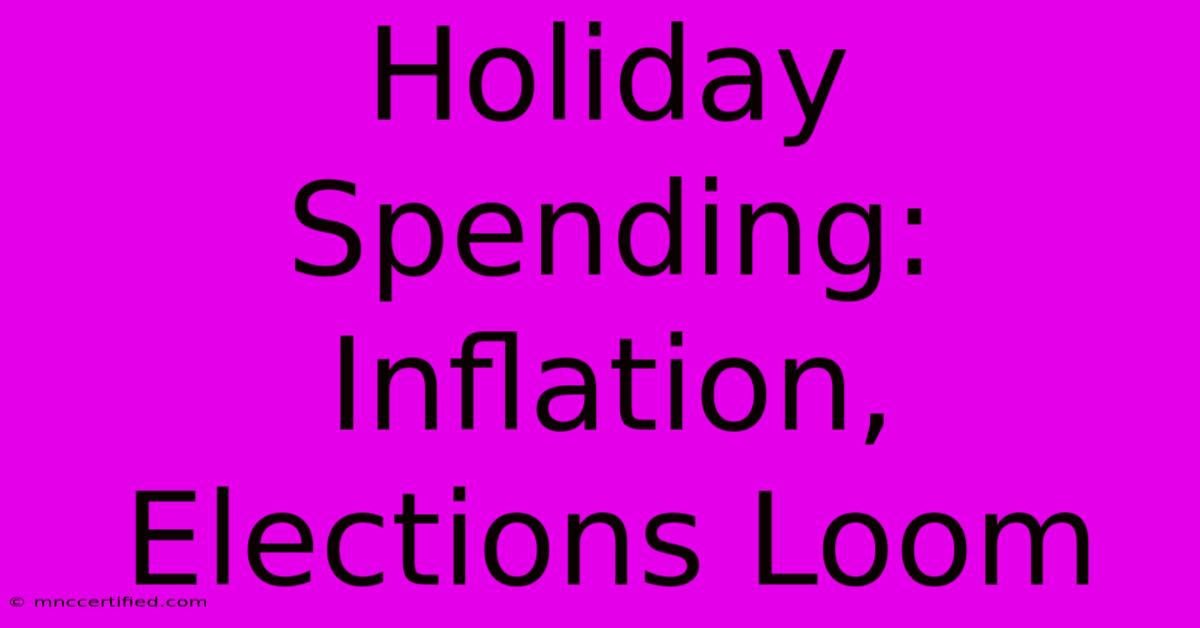Holiday Spending: Inflation, Elections Loom

Table of Contents
Holiday Spending: Inflation, Elections Loom
The holiday season is traditionally a time of joy, family, and…significant spending. But this year, consumers face a unique set of challenges as they navigate the festive shopping period: high inflation and the looming shadow of upcoming elections. This confluence of economic and political factors is poised to significantly impact how much people spend and what they buy this holiday season.
The Inflationary Squeeze on Holiday Budgets
Inflation has relentlessly eroded purchasing power throughout 2023, impacting everything from groceries to gasoline. This translates directly into tighter holiday budgets for many families. The rising cost of goods and services means consumers are forced to make difficult choices, potentially scaling back on non-essential purchases or opting for cheaper alternatives.
Impact on Spending Habits:
- Shifting Priorities: Expect a greater focus on necessities over luxury items. Consumers may prioritize gifts for children and immediate family over extended relatives or elaborate celebrations.
- Increased Price Sensitivity: Deal-hunting and comparison shopping will become paramount. Consumers will be more likely to switch brands or retailers to find the best prices.
- Delayed Purchases: Some consumers may delay their holiday shopping until closer to the holidays, hoping for better deals or sales. This could lead to potential stock shortages in certain product categories.
- Smaller Gift Budgets: The overall budget allocated for gifts may be significantly smaller than in previous years, leading to fewer gifts or less expensive gifts.
Elections and Their Influence on Consumer Confidence
The looming elections also play a crucial role in shaping consumer sentiment and spending habits. Uncertainty about future economic policies and potential changes in government spending can lead to hesitancy among consumers.
Political Uncertainty and Spending:
- Wait-and-See Approach: Political uncertainty can create a "wait-and-see" approach among consumers, delaying major purchases until the political landscape becomes clearer.
- Impact on Consumer Confidence: Negative election news or close election results can negatively impact consumer confidence, leading to decreased spending.
- Potential for Increased Taxes: Depending on the election results, consumers might anticipate potential tax increases, influencing their spending habits and saving plans. This anticipation could further tighten budgets.
Navigating the Holiday Season Wisely
Despite the economic headwinds, the holiday spirit remains strong. However, navigating this unique holiday season requires careful planning and strategic decision-making.
Tips for Smart Holiday Spending:
- Create a Realistic Budget: Set a clear budget and stick to it. Track your spending meticulously to avoid overspending.
- Shop Early and Compare Prices: Start shopping early to secure better deals and avoid last-minute price hikes. Utilize price comparison websites and apps.
- Take Advantage of Sales and Promotions: Look for discounts, coupons, and promotional offers. Consider shopping during Black Friday and Cyber Monday.
- Consider Experiences Over Material Gifts: Experiences, such as family outings or shared activities, can be more valuable and memorable than material gifts.
- Prioritize Needs Over Wants: Focus on purchasing essential items and gifts that hold true value over frivolous purchases.
- Utilize Credit Cards Wisely: If using credit cards for holiday shopping, ensure you can comfortably pay off your balance before accruing significant interest charges.
Conclusion: A Season of Adaptation
This holiday season will undoubtedly be different from those of the past. The combined pressures of inflation and the upcoming elections demand a more cautious and strategic approach to holiday spending. By carefully planning, comparing prices, and prioritizing needs, consumers can navigate these challenges and still enjoy a meaningful and festive season without breaking the bank. Remember, smart spending doesn't mean sacrificing the joy of the holidays; it simply means making informed decisions to ensure a brighter financial future.

Thank you for visiting our website wich cover about Holiday Spending: Inflation, Elections Loom. We hope the information provided has been useful to you. Feel free to contact us if you have any questions or need further assistance. See you next time and dont miss to bookmark.
Featured Posts
-
Two Us Pilots Killed In Red Sea Incident
Dec 23, 2024
-
Falcons Win Penix Jr Leads The Charge
Dec 23, 2024
-
Premier League Everton Vs Chelsea Live Stream
Dec 23, 2024
-
Flintoffs Health Wealth And Marriage
Dec 23, 2024
-
Flintoff Family Post Crash Warning Received
Dec 23, 2024